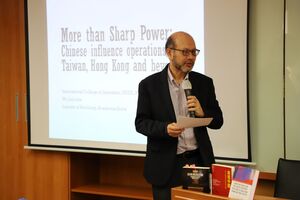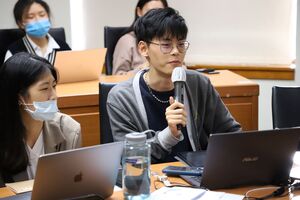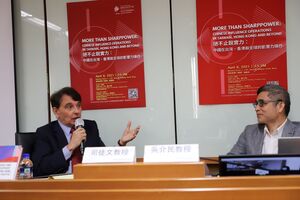International College of Innovation's Public Speech: “More than sharp power: Chinese influence operations in Taiwan, Hong Kong and beyond”



Date :
2021-04-14
Department :
International College of Innovation
【Article by International College of Innovation】
On April 6th afternoon, the International College of Innovation held a public speech on Chinese influence operations in Taiwan, Hong Kong and beyond in the Meeting Room 1, 13F of NCCU’s General Building South Wing. This public speech was hosted by International College of Innovation and co-hosted by NCCU Department of Sociology. The speech was given by Dr. Jieh-min Wu 吳介民, Research Fellow, Institute of Sociology, Academia Sinica and followed by Dr. William Stanton 司徒文, Vice President of National Yang Ming University, former Director of the American Institute in Taiwan (AIT). The main topic of the public speech is to discuss how the Chinese sharp power has become a global phenomenon and in which ways can it influence different areas and countries around the world.
Dr. Jieh-min Wu is a Research Fellow at the Institute of Sociology, Academia Sinica, Taiwan. He co-founded the Center for Contemporary China (CfCC) at National Tsing Hua University in 2003 and served as the director during 2005-2007. His research interests include social movement, democratization, economic development, and Taiwan-China relations. He has published extensively on Taiwan’s democracy, China’s development and Hong Kong’s civic movement. This speech’s content “More than sharp power: Chinese influence operations in Taiwan, Hong Kong and beyond” is one of the chapters in Dr. Jieh-min Wu’s recently published book: ”China’s influence and the Center - periphery Tug of war in Hong Kong, Taiwan and Indo-Pacific”. Bringing together a team of cutting-edge researchers based in Hong Kong, Taiwan and Indo-Pacific countries, this book focuses on the tug of war between China’s influence and forces of resistance in Hong Kong, Taiwan and selected countries in its surrounding jurisdictions. Dr. Wu together with other authors, editors and contributors had spent 5 years, from 2015 to 2020 to publish the book.
To begin with, Dr. Wu introduced his key ideas and themes in the speech: “The united - front story unknown to the West: Taiwan and Hong Kong case”, “More than sharp power” and “High politics vs daily penetration “. Next, he discussed the three modes of influence operations that Mainland China applies in Taiwan: External coercion (direct pressuring), Penetration from within (indirect pressuring), Eroding political boundaries (direct pressuring + mixed strategy) with his own graphic figures. In addition, the Professor also analysed five issues areas and Taiwan cases including the interference in election, media control, tourism, religious exchange and entertainment industry. There have been pushback from both Taiwan and Hong Kong regarding the pressure from Mainland China through major movements and had gained some achievement in the first place. Furthermore, Professor also made comparisons of Mainland China’s influence between different countries beyond Hong Kong and Taiwan. For example, the THAAD missile dispute between South Korea and Mainland China, the Czech Republic, Australia and vast regions under the BRI development. Finally, Dr. Wu summarized his ideas through some conclusive remarks, stating that his research is “One step forward for the study of sharp power, authoritarian diffusion, and pushbacks”. He also explained how Mainland China’s sharp power had impacted the world and what’s more than sharp power is the commercialization of the united-front strategy. All in all, he shared his opinion that “The China problem” will still linger for a long time in the future.
The discussion then followed by Dr. William Stanton. Since his retirement as a diplomat, he has been a professor at National Tsinghua University and at National Taiwan University in Taiwan. He is currently Vice President of National Yang Ming University. He thanked Dr. Jieh-min Wu for the speech through which Mainland China’s influence operations had been made clear and comprehensive and helped the audience to have a deeper insight into “The China’s problem”. As a former U.S diplomat and the former Director of the AIT, Dr. William Stanton shared his stories in Beijing before and after the Tiananmen Square Massacre and showed his opinion about the cross-strait relations. He remembered receiving a lot of phone calls from the Beijing government to warn and prevent his travel to Taiwan when he was a diplomat and the same cases applied for his colleagues. Dr. William Stanton also stated that many U.S businessmen wanted to invest in Mainland China and improve the U.S - China relationship since China is a large and potential market. The Cross-strait relation have been tense for many years and China’s sharp power is growing more and more. In his recent commentary on Taiwan News, Dr. William Stanton expressed his opinion regarding agents of influence acting on behalf of China. He argued that “Given all of Henry Kissinger’s reputed brilliance in foreign policy, we might imagine he would finally recognize that perhaps his triumph in helping to establish relations between the United States and the People’s Republic of China (PRC) might not have been such a great success after all. For a while, of course, it served the principal goal of dividing China from the Soviet Union, but now they are among the closest military and political allies in the world.” What’s more, he also questioned that although U.S view has finally changed and adopted a “tough-minded approach to China”, but is it “too little, too late”?
The public speech is also a guest lecture of the International College of Innovation (ICI) course: Global Issues in Asia in this 2021 Spring Semester. The students in this course are able to learn about the global issues in Asia such as economic growth, precarity and China’s factor, v.v. The course examines how global issues emerge in Asian society, as well as how different societies respond to key issues. It introduces students to core conversations and new concerns in Asian studies.
During the Q&A session, one student from ICI and also from the Global Issues in Asia course asked whether Taiwan also has a sort of sharp power towards Mainland China as Taiwan also contributes to China's economy. In response to this question, Dr. Jieh-min Wu answered that since Taiwan’s political system and regime differs from the Mainland China, holding a sharp power is not possible in this case. Another question came from a Diplomacy department student, she asked if the speaker thought U.S President’s Donald Trump’s rigid response to China was effective or not. To answer the question, Dr. William Stanton responded “Don’t get me wrong, I’m not a big Trump’s supporter, but he was the first one to play a tougher card on China and I think he was just on time!”
The public speech then came to an end and the speakers together with the professors and students took a group photo. The public speech was a great chance for the students to acquire more knowledge about Cross-strait relation and China studies as well as global issues in Asia from the well-known researcher and politician. Covering Asian studies as one of the main fields, International College of Innovation offers courses and events related to global studies. In the future, International College of Innovation is going to hold more interesting events so make sure to check out our upcoming events so that you will not miss the chance to sharpen your knowledge and become a global citizen in the globalization era !
On April 6th afternoon, the International College of Innovation held a public speech on Chinese influence operations in Taiwan, Hong Kong and beyond in the Meeting Room 1, 13F of NCCU’s General Building South Wing. This public speech was hosted by International College of Innovation and co-hosted by NCCU Department of Sociology. The speech was given by Dr. Jieh-min Wu 吳介民, Research Fellow, Institute of Sociology, Academia Sinica and followed by Dr. William Stanton 司徒文, Vice President of National Yang Ming University, former Director of the American Institute in Taiwan (AIT). The main topic of the public speech is to discuss how the Chinese sharp power has become a global phenomenon and in which ways can it influence different areas and countries around the world.
Dr. Jieh-min Wu is a Research Fellow at the Institute of Sociology, Academia Sinica, Taiwan. He co-founded the Center for Contemporary China (CfCC) at National Tsing Hua University in 2003 and served as the director during 2005-2007. His research interests include social movement, democratization, economic development, and Taiwan-China relations. He has published extensively on Taiwan’s democracy, China’s development and Hong Kong’s civic movement. This speech’s content “More than sharp power: Chinese influence operations in Taiwan, Hong Kong and beyond” is one of the chapters in Dr. Jieh-min Wu’s recently published book: ”China’s influence and the Center - periphery Tug of war in Hong Kong, Taiwan and Indo-Pacific”. Bringing together a team of cutting-edge researchers based in Hong Kong, Taiwan and Indo-Pacific countries, this book focuses on the tug of war between China’s influence and forces of resistance in Hong Kong, Taiwan and selected countries in its surrounding jurisdictions. Dr. Wu together with other authors, editors and contributors had spent 5 years, from 2015 to 2020 to publish the book.
To begin with, Dr. Wu introduced his key ideas and themes in the speech: “The united - front story unknown to the West: Taiwan and Hong Kong case”, “More than sharp power” and “High politics vs daily penetration “. Next, he discussed the three modes of influence operations that Mainland China applies in Taiwan: External coercion (direct pressuring), Penetration from within (indirect pressuring), Eroding political boundaries (direct pressuring + mixed strategy) with his own graphic figures. In addition, the Professor also analysed five issues areas and Taiwan cases including the interference in election, media control, tourism, religious exchange and entertainment industry. There have been pushback from both Taiwan and Hong Kong regarding the pressure from Mainland China through major movements and had gained some achievement in the first place. Furthermore, Professor also made comparisons of Mainland China’s influence between different countries beyond Hong Kong and Taiwan. For example, the THAAD missile dispute between South Korea and Mainland China, the Czech Republic, Australia and vast regions under the BRI development. Finally, Dr. Wu summarized his ideas through some conclusive remarks, stating that his research is “One step forward for the study of sharp power, authoritarian diffusion, and pushbacks”. He also explained how Mainland China’s sharp power had impacted the world and what’s more than sharp power is the commercialization of the united-front strategy. All in all, he shared his opinion that “The China problem” will still linger for a long time in the future.
The discussion then followed by Dr. William Stanton. Since his retirement as a diplomat, he has been a professor at National Tsinghua University and at National Taiwan University in Taiwan. He is currently Vice President of National Yang Ming University. He thanked Dr. Jieh-min Wu for the speech through which Mainland China’s influence operations had been made clear and comprehensive and helped the audience to have a deeper insight into “The China’s problem”. As a former U.S diplomat and the former Director of the AIT, Dr. William Stanton shared his stories in Beijing before and after the Tiananmen Square Massacre and showed his opinion about the cross-strait relations. He remembered receiving a lot of phone calls from the Beijing government to warn and prevent his travel to Taiwan when he was a diplomat and the same cases applied for his colleagues. Dr. William Stanton also stated that many U.S businessmen wanted to invest in Mainland China and improve the U.S - China relationship since China is a large and potential market. The Cross-strait relation have been tense for many years and China’s sharp power is growing more and more. In his recent commentary on Taiwan News, Dr. William Stanton expressed his opinion regarding agents of influence acting on behalf of China. He argued that “Given all of Henry Kissinger’s reputed brilliance in foreign policy, we might imagine he would finally recognize that perhaps his triumph in helping to establish relations between the United States and the People’s Republic of China (PRC) might not have been such a great success after all. For a while, of course, it served the principal goal of dividing China from the Soviet Union, but now they are among the closest military and political allies in the world.” What’s more, he also questioned that although U.S view has finally changed and adopted a “tough-minded approach to China”, but is it “too little, too late”?
The public speech is also a guest lecture of the International College of Innovation (ICI) course: Global Issues in Asia in this 2021 Spring Semester. The students in this course are able to learn about the global issues in Asia such as economic growth, precarity and China’s factor, v.v. The course examines how global issues emerge in Asian society, as well as how different societies respond to key issues. It introduces students to core conversations and new concerns in Asian studies.
During the Q&A session, one student from ICI and also from the Global Issues in Asia course asked whether Taiwan also has a sort of sharp power towards Mainland China as Taiwan also contributes to China's economy. In response to this question, Dr. Jieh-min Wu answered that since Taiwan’s political system and regime differs from the Mainland China, holding a sharp power is not possible in this case. Another question came from a Diplomacy department student, she asked if the speaker thought U.S President’s Donald Trump’s rigid response to China was effective or not. To answer the question, Dr. William Stanton responded “Don’t get me wrong, I’m not a big Trump’s supporter, but he was the first one to play a tougher card on China and I think he was just on time!”
The public speech then came to an end and the speakers together with the professors and students took a group photo. The public speech was a great chance for the students to acquire more knowledge about Cross-strait relation and China studies as well as global issues in Asia from the well-known researcher and politician. Covering Asian studies as one of the main fields, International College of Innovation offers courses and events related to global studies. In the future, International College of Innovation is going to hold more interesting events so make sure to check out our upcoming events so that you will not miss the chance to sharpen your knowledge and become a global citizen in the globalization era !
